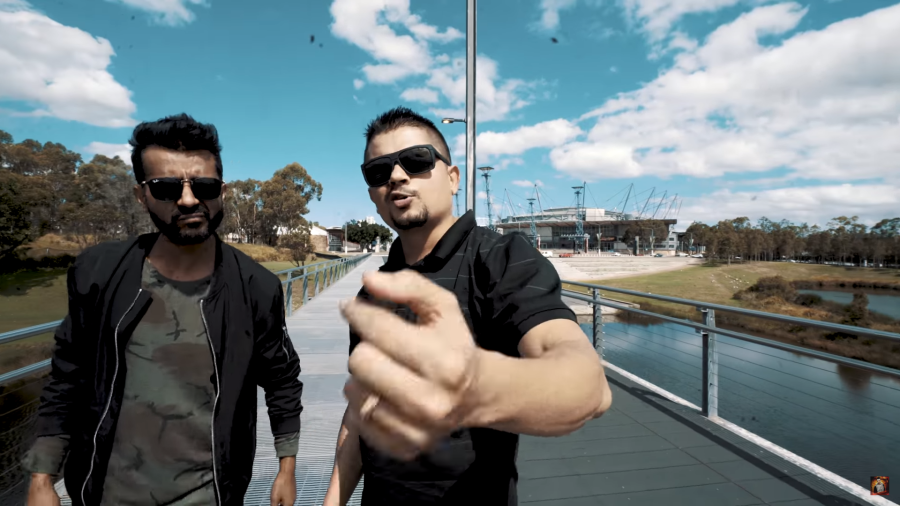Entertainment
DA 69 has been there, done that, and now he’s doing it all over again
Sudin Pokharel, aka DA 69, one of Nephop’s most celebrated names, disappeared from the limelight nearly eight years ago, but now he’s back.
Tsering Ngodup Lama
In 2001, the rap duo GP—Girish Khatiwada and Pranil Timalsena—dropped a track titled 'Ma yesto chu, ma usto chu', featuring a then unknown rapper named Sudin Pokharel. The song went on to become a runaway hit, not only cementing GP's status as a pioneering rap outfit but also catapulting Pokharel from obscurity into the limelight.
Two years later, in 2003, Pokharel, who now went by the moniker DA 69, collaborated with Pranil Timalsena again for the track 'Aakhabhari'. The track topped the charts, and the duo even won a Hits FM Music Award. Pokharel had firmly established himself as a standout rapper in the nascent 'Nephop' scene when he went on to form the rap group 'The Unity' with Asif Shah and Amit (Aidray). And for the next half-decade, many of their tracks would become massive hits.
But in 2011, Pokharel left everything he had built for himself in Nepal and moved to Australia. He even deactivated all of his social media accounts. The move took many by surprise, and for the next seven and a half years, he remained in obscurity.
Then, in 2019, Pokharel resurfaced on social media and started releasing videos of him spitting new rhymes, announcing the return of DA 69 to the world of Nephop. Although he remains in Australia, Pokharel has plans to release a bunch of new music. In this interview with the Post's Tsering Ngodup Lama, Pokharel discusses why he chose to disappear and the plans for his comeback. Excerpts:
Quitting something that you had devoted nearly 13 years of your life to cannot have been easy. What prompted you to take that decision?
It wasn't an easy decision to make, and it wasn’t sudden either. The years preceding 2011 had been challenging. Even though I was a TV host [a newsreader and program presenter for Kantipur Television] and a well-known musician, I wasn't happy with the way things were working. Television was my passion and music was my life. As a journalist, I was quite frustrated with the way things were working. Even the music industry wasn't doing well. The number of concerts were too far and few in between. Our band, though very popular, wasn't faring well financially. So I made the decision to leave Nepal for greener pastures, and on November 11, 2011, I left everything and flew to Australia. Was it the right decision? I still don't know. I did what was right for me then.
What kept you busy during the many years that you were away? And what led you to come back to music?
I have been busy with my family. I have a very supportive wife and we have a three-year-old daughter, Maya. Just like me, my daughter loves singing. I have been spending a lot of time with them. I have also been busy with the people from whom I had strayed during the 10 years that I was busy pursuing name and fame.
I decided to make a comeback because I think I have a lot to say, and what’s a better platform than music. When I made my debut 15 years ago, I wanted to prove myself. I was worried about not being able to make a mark. But that's not the case this time. How my songs will be received doesn’t bother me anymore.
Were you always interested in rap?
Music was something I was always interested in. While commuting from home to school and back, I was always singing. Bollywood songs heavily dominated the music scene in Biratnagar during those years, and that's what I sang. It wasn't until 1995 or 96 that I first listened to a rap song. It was Girish Khatiwada's single ‘Meaningless Rap’ and I was hooked. I then started listening to rap music religiously. But unlike today, where international music is at everyone’s fingertips, I only had access to cassettes from Indian rappers like Style Bhai, Piyush Soni and Apache Indian.
You even started a band with Sugam Pokharel, right?
I met Sugam Pokharel in 1998 or 99 when I was a student at Ratna Rajya Laxmi College. Both of us were musically inclined and decided to start a band, which we named SUPOKS. We recorded a few songs, none of which garnered any attention. We were both amateurs and I am sure our songs reflected our lack of experience. We asked our parents for money to foot our recording bills, and it cost us Rs10,000 per song. We eventually ended up going our separate ways.
Looking back, the decision to split was the right one, as we both went on to have successful individual musical careers. After the split, I was performing at a concert in Biratnagar when Girish, who also happened to be there, saw my performance and liked it. He then told me that he would help me get into the music scene. Not long after that, Girish contacted me and told me to come to Alfa Studio in Chhauni. There, he handed me a verse and told me to rap. The verse was 'Corrupted mero brain, Everything is fake, Ghar ma eklai basda rap videos in the deck'. Girish liked my rap, and that's how I got to feature in 'Ma yesto chu'. To get to work with two of the biggest names in Nephop was a dream for me. The song became a huge hit, and the rest, as they say, is history.
What has changed now for aspiring Nepali musicians?
It's an entirely different world. The advent of YouTube completely changed the game. Aspiring musicians no longer need to struggle as much as those from the pre-YouTube era. Musicians no longer have to travel to Kathmandu to record a song. They can just go online and upload their work on social media platforms. This gives artistes a lot of creative freedom, which they might not necessarily have if they have to be bound to a music company or a label.
But at the same time, there are myriad choices for the audience too. So, in a way, artistes are under constant pressure to give their best, which is a good thing as it uplifts the quality of music.
As for Nephop, it makes me very happy to see the sheer number of youngsters choosing to rap in Nepali. There are some quality rappers who I think can make a mark at the international level.
Your comeback announcement sent your fans into a social media flurry. What was it like seeing their reactions?
It was an overwhelming experience. I had tears in my eyes going through messages that read, “Your music made my childhood better”, “I stole money from dad to buy your album”, “My family watched the news because of you.” I have been away from media, music and social media for almost eight years, and then to see the love and support even after all these years was humbling and motivating.
Tell us a little about what's in store.
The first single I'll be releasing is titled 'Josh'. It will be released in the second week of November. The song is about why I decided to quit music and journalism, and what kept me occupied during my long break. I am working with Mista Bling, a very talented producer, on the song. I think a lot of artists will be able to relate to the lyrics.
I am also working on a few solos and collaborations. Our band The Unity will also be getting back together. There are a lot of exciting things in the works.




 12.12°C Kathmandu
12.12°C Kathmandu










